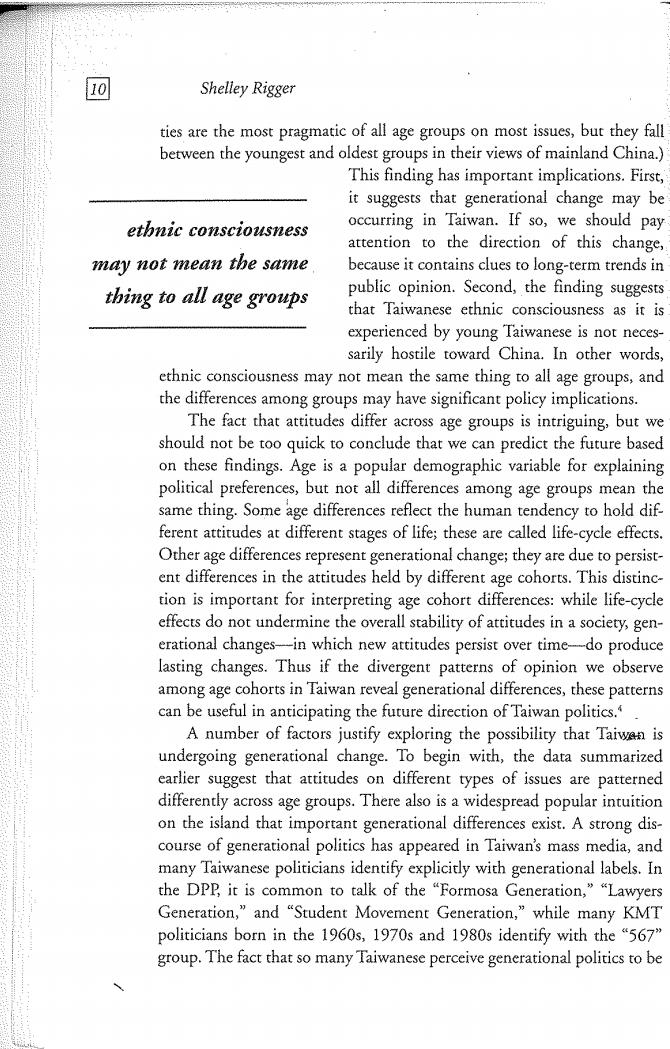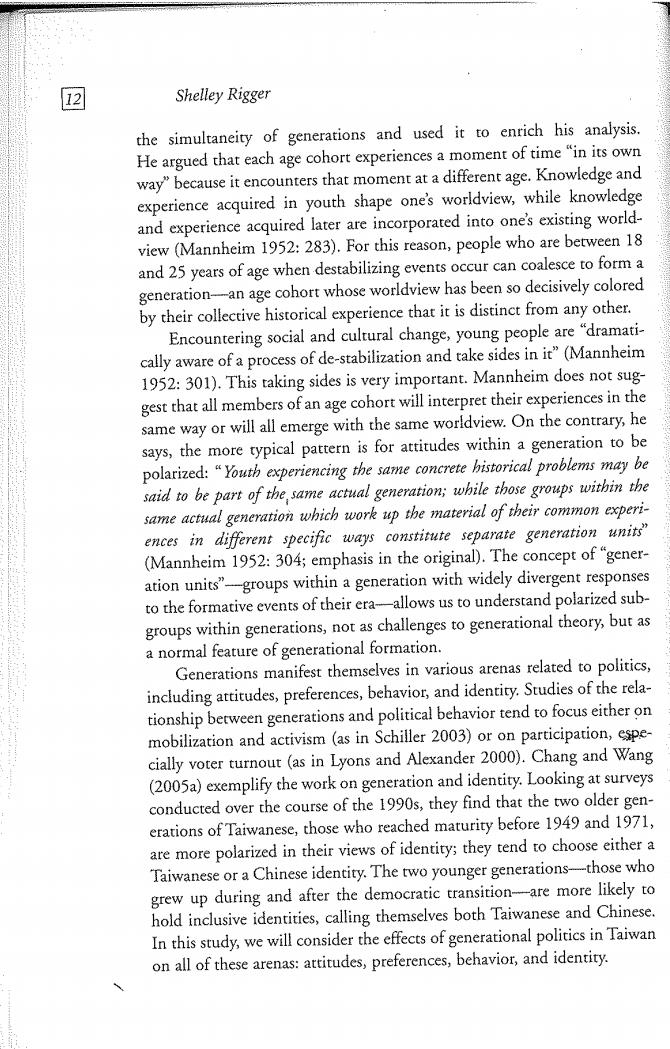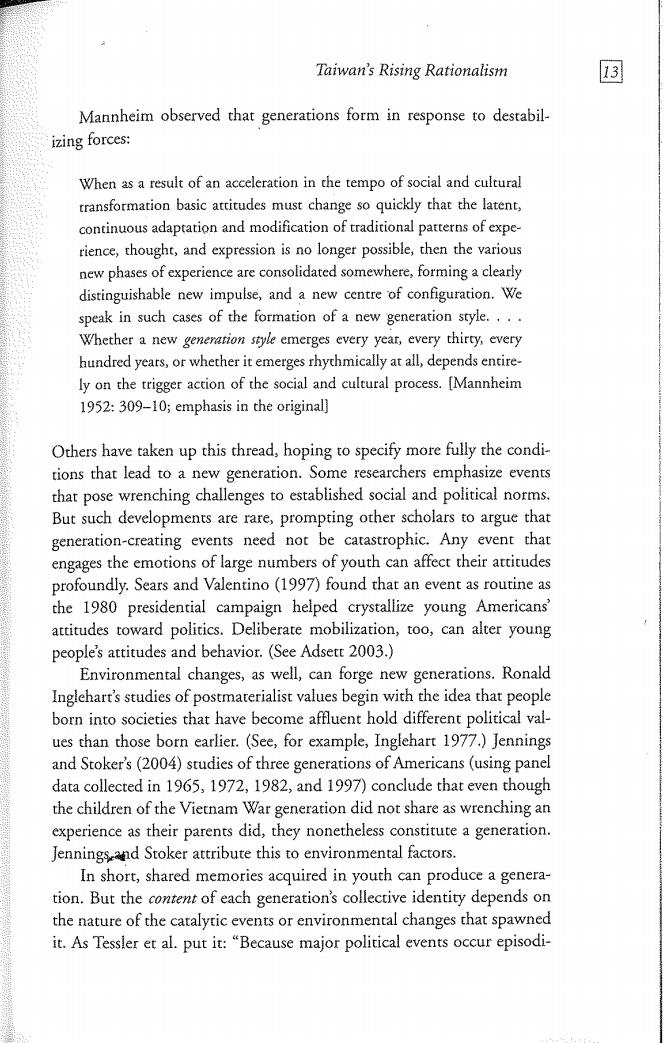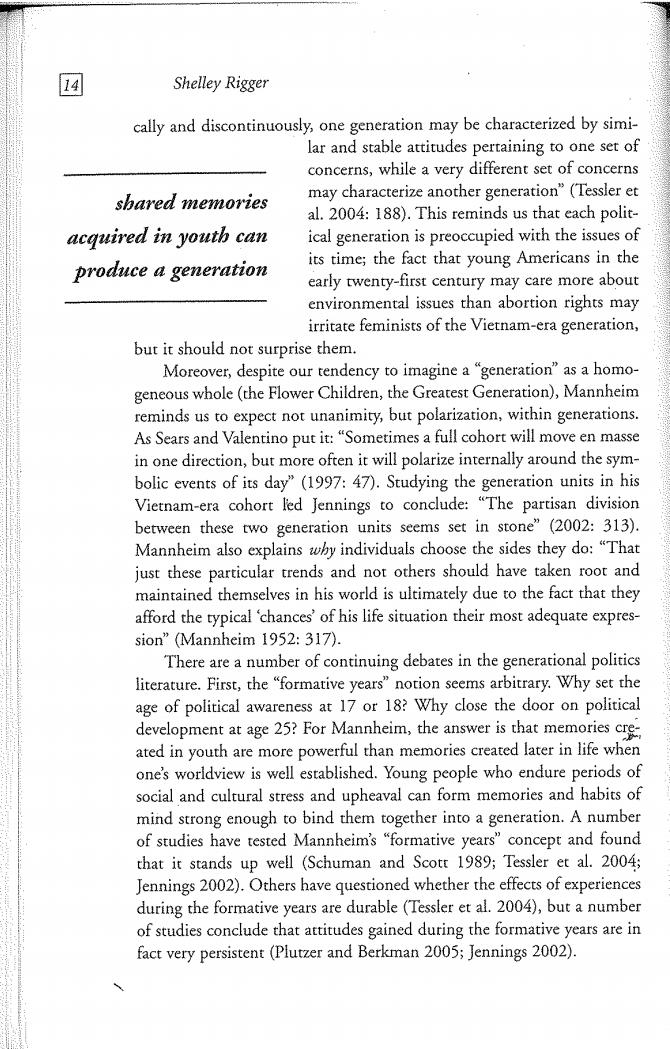
0 Shelley Rigger ties are the most pragmatic of all age groups on most issues,but they fall between the youngest and oldest groups in their views of mainland China.) This finding has important implications.First, it suggests that generational change may be ethnic consciousness occurring in Taiwan.If so,we should pay attention to the direction of this change, may not mean the same because it contains clues to long-term trends in thing to all age groups public opinion.Second,the finding suggests that Taiwanese ethnic consciousness as it is experienced by young Taiwanese is not neces- sarily hostile toward China.In other words, ethnic consciousness may not mean the same thing to all age groups,and the differences among groups may have significant policy implications. The fact that attitudes differ across age groups is intriguing,but we should not be too quick to conclude that we can predict the future based on these findings.Age is a popular demographic variable for explaining political preferences,but not all differences among age groups mean the same thing.Some age differences reflect the human tendency to hold dif ferent attitudes at different stages of life;these are called life-cycle effects. Other age differences represent generational change;they are due to persist- ent differences in the attitudes held by different age cohorts.This distinc- tion is important for interpreting age cohort differences:while life-cycle effects do not undermine the overall stability of attitudes in a society,gen- erational changes-in which new attitudes persist over time-do produce lasting changes.Thus if the divergent patterns of opinion we observe among age cohorts in Taiwan reveal generational differences,these patterns can be useful in anticipating the future direction of Taiwan politics. A number of factors justify exploring the possibility that Taiwan is undergoing generational change.To begin with,the data summarized earlier suggest that attitudes on different types of issues are patterned differently across age groups.There also is a widespread popular intuition on the island that important generational differences exist.A strong dis- course of generational politics has appeared in Taiwan's mass media,and many Taiwanese politicians identify explicitly with generational labels.In the DPP,it is common to talk of the“Formosa Generation,”“Lawyers Generation,”and“Student Movement Generation,”while many KMT politicians born in the 1960s,1970s and 1980s identify with the"567" group.The fact that so many Taiwanese perceive generational politics to be

Taiwan's Rising Rationalism 回 important suggests that generational change is worthy of detailed study, and indeed a number of scholars have undertaken this work (Wu 1999; Liu 1993,1994,1996;Chen 1996;Chu 2004;Chang and Wang 2005a). Finally,from a theoretical perspective,the sweeping transformation of Taiwan politics over the past five decades provides precisely the type of sociocultural environment that social science theory associates with generational change. Generations in Politics:A Review of the Literature Karl Mannheim's 1928 essay,"The Problem of Generations,"is the start- ing point for most social scientific investigations of generational politics. In his essay Mannheim synthesized ideas from a variety of disciplines into a series of fundamental insights.Those insights have provided hypotheses for decades of research,so it is worth considering them here in some detail. According to Mannheim,generations have two defining features. First,members of a generation are born at the same time and in the same cultural context.But sharing a temporal and spatial location makes a group an age cohort,not a generation.To become a generation,as Mannheim defines it,an age cohort must,during its formative years,col- lectively pass through events and experiences that destabilize prevailing social and cultural norms:"Generation...involves even more than mere co-presence in such a historical and social region.A further concrete nexus is needed to constitute generation as an actuality.This additional nexus may be described as participation in the common destiny of this historical and social unity"(Mannheim 1952:303).In defining generation in terms of the distinct and formative historical experiences shaping people born in a particular time and place,Mannheim stamps the concept with his own interpretation,but he also rescues it from being a merely technical desig- nation with little substantive interest or explanatory power.In the process, he also sets the parameters for future studies.A recent study of generations and voting patterns in U.S.elections (Lyons and Alexander 2000)illus- trates Mannheim's seminal influence:"Our definition of generation encompasses a full set of experiences common to a large segment of the electoraterA cohort,on the other hand,is a measurement device not nec- essarily tied to generation(p.1,020). One obvious problem for any discussion of generations is that they overlap;members of different generations experience the events of each moment in history at the same time.Mannheim tackled the problem of

2 Shelley Rigger the simultaneity of generations and used it to enrich his analysis. He argued that each age cohort experiences a moment of time"in its own way"because it encounters that moment at a different age.Knowledge and experience acquired in youth shape one's worldview,while knowledge and experience acquired later are incorporated into one's existing world- view (Mannheim 1952:283).For this reason,people who are between 18 and 25 years of age when destabilizing events occur can coalesce to form a generation-an age cohort whose worldview has been so decisively colored by their collective historical experience that it is distinct from any other. Encountering social and cultural change,young people are"dramati- cally aware of a process of de-stabilization and take sides in it"(Mannheim 1952:301).This taking sides is very important.Mannheim does not sug- gest that all members of an age cohort will interpret their experiences in the same way or will all emerge with the same worldview.On the contrary,he says,the more typical pattern is for attitudes within a generation to be polarized:"Youth experiencing the same concrete historical problems may be said to be part of the same actual generation:while those groups within the same actual generation which work up the material of their common experi- ences in different specific ways constitute separate generation units (Mannheim 1952:304;emphasis in the original).The concept of "gener- ation units"-groups within a generation with widely divergent responses to the formative events of their era-allows us to understand polarized sub- groups within generations,not as challenges to generational theory,but as a normal feature of generational formation. Generations manifest themselves in various arenas related to politics, including attitudes,preferences,behavior,and identity.Studies of the rela- tionship between generations and political behavior tend to focus either on mobilization and activism(as in Schiller 2003)or on participation,espe- cially voter turnout(as in Lyons and Alexander 2000).Chang and Wang (2005a)exemplify the work on generation and identity.Looking at surveys conducted over the course of the 1990s,they find that the two older gen- erations of Taiwanese,those who reached maturity before 1949 and 1971, are more polarized in their views of identity;they tend to choose either a Taiwanese or a Chinese identity.The two younger generations-those who grew up during and after the democratic transition-are more likely to hold inclusive identities,calling themselves both Taiwanese and Chinese. In this study,we will consider the effects of generational politics in Taiwan on all of these arenas:attitudes,preferences,behavior,and identity

Taiwan's Rising Rationalism 固 Mannheim observed that generations form in response to destabil- izing forces: When as a result of an acceleration in the tempo of social and cultural transformation basic attitudes must change so quickly that the latent, continuous adaptation and modification of traditional patterns of expe- rience,thought,and expression is no longer possible,then the various new phases of experience are consolidated somewhere,forming a clearly distinguishable new impulse,and a new centre of configuration.We speak in such cases of the formation of a new generation style.... Whether a new generation style emerges every year,every thirty,every hundred years,or whether it emerges rhychmically at all,depends entire- ly on the trigger action of the social and cultural process.[Mannheim 1952:309-10;emphasis in the original] Others have taken up this thread,hoping to specify more fully the condi- tions that lead to a new generation.Some researchers emphasize events that pose wrenching challenges to established social and political norms. But such developments are rare,prompting other scholars to argue that generation-creating events need not be catastrophic.Any event that engages the emotions of large numbers of youth can affect their attitudes profoundly.Sears and Valentino(1997)found that an event as routine as the 1980 presidential campaign helped crystallize young Americans' attitudes toward politics.Deliberate mobilization,too,can alter young people's attitudes and behavior.(See Adsett 2003.) Environmental changes,as well,can forge new generations.Ronald Inglehart's studies of postmaterialist values begin with the idea that people born into societies that have become affluent hold different political val- ues than those born earlier.(See,for example,Inglehart 1977.)Jennings and Stoker's(2004)studies of three generations of Americans(using panel data collected in 1965,1972,1982,and 1997)conclude that even though the children of the Vietnam War generation did not share as wrenching an experience as their parents did,they nonetheless constitute a generation. Jenningsand Stoker attribute this to environmental factors. In short,shared memories acquired in youth can produce a genera- tion.But the content of each generation's collective identity depends on the nature of the catalytic events or environmental changes that spawned it.As Tessler et al.put it:"Because major political events occur episodi-

4 Shelley Rigger cally and discontinuously,one generation may be characterized by simi- lar and stable attitudes pertaining to one set of concerns,while a very different set of concerns shared memories may characterize another generation"(Tessler et al.2004:188).This reminds us that each polit- acquired in youth can ical generation is preoccupied with the issues of produce a generation its time;the fact that young Americans in the early twenty-first century may care more about environmental issues than abortion rights may irritate feminists of the Vietnam-era generation, but it should not surprise them. Moreover,despite our tendency to imagine a"generation"as a homo- geneous whole(the Flower Children,the Greatest Generation),Mannheim reminds us to expect not unanimity,but polarization,within generations. As Sears and Valentino put it:"Sometimes a full cohort will move en masse in one direction,but more often it will polarize internally around the sym- bolic events of its day"(1997:47).Studying the generation units in his Vietnam-era cohort led Jennings to conclude:"The partisan division between these two generation units seems set in stone"(2002:313). Mannheim also explains wby individuals choose the sides they do:"That just these particular trends and not others should have taken root and maintained themselves in his world is ultimately due to the fact that they afford the typicalchances'of his life situation their most adequate expres- sion"(Mannheim 1952:317). There are a number of continuing debates in the generational politics literature.First,the"formative years"notion seems arbitrary.Why set the age of political awareness at 17 or 18?Why close the door on political development at age 25?For Mannheim,the answer is that memories cre ated in youth are more powerful than memories created later in life when one's worldview is well established.Young people who endure periods of social and cultural stress and upheaval can form memories and habits of mind strong enough to bind them together into a generation.A number of studies have tested Mannheim's "formative years"concept and found that it stands up well (Schuman and Scott 1989;Tessler et al.2004; Jennings 2002).Others have questioned whether the effects of experiences during the formative years are durable(Tessler et al.2004),but a number of studies conclude that attitudes gained during the formative years are in fact very persistent(Plutzer and Berkman 2005;Jennings 2002)